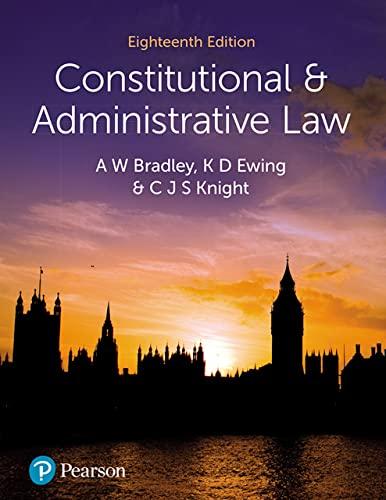Question
Section 75 Concept: 'Privity of contract' is a common law principle that a party not privy to a contract cannot sue on it where the
Section 75 Concept:
'Privity of contract' is a common law principle that a party not privy to a contract cannot sue on it where the seller is in breach thereof, the buyer has no remedy against the creditor except against the seller/supplier.
The exception to the rule is provided by the Consumer Credit Act 1974. To safeguard credit card transactions s75 makes the credit card provider jointly liable with the retailer for consumer purchases provided the cost is between 100 and 30,000, thereby entitling consumers to claim a refund where actionable disputes arise with the purchase. As mentioned, there must debtor-creditor-supplier agreement as within s12(b) or (c)[1] which has, in relation to a transaction financed by the agreement, any claim against the supplier in respect of a misrepresentation or breach of contract, he shall have a like claim against the creditor, who, with the supplier, shall be jointly and severally liable.[2] A debtor can advance claim against the seller, the creditor or both.
The argument being advanced against this concept by the credit industry is that it is unfair to make them liable for a transaction since they were not privy to the contract between the debtor and the supplier of goods or services; however, s.75 does not apply to hire-purchase, conditional sale and credit sale agreements[3] especially where the credit company does not itself purchase the goods and buy the goods and then supply them to the debtor but instead provides the loan to the debtor to enable the debtor himself to buy the goods direct from the dealer. The agreement here between the creditor and the debtor is not termed a hire purchase, conditional sale or credit agreement, but rather a loan agreement. Where the loan contract is a regulated debtor-creditor-supplier agreement in that it is made as a result of business arrangements between the dealer and the finance company, the section will then apply as seen United Dominions Trust v Taylor [1980]. [4]
Can the above reasoning be legitimately advanced in contrary to the concept that the section is unfair?
Footnotes:
[1](b)a restricted-use credit agreement which falls within section 11(1)(b) and is made by the creditor under pre-existing arrangements, or in contemplation of future arrangements, between himself and the supplier, or (c)an unrestricted-use credit agreement which is made by the creditor under pre-existing arrangements between himself and a person (the "supplier ") other than the debtor in the knowledge that the credit is to be used to finance a transaction between the debtor and the supplier.
[2]Section 75 of the Consumer Credit Act 1974
[3]as was inPorter v General Guarantee Corporation[1982]
[4]A finance company lent money to the defendant to buy a car from a dealership. The finance company brought proceedings against him to enforce the loan agreement. defendant based his defence on s.75 that he had a claim against Parkaway Cars for breach of contract and for misrepresentation because the car had been misrepresented to be in a good condition when in fact it was unroadworthy. It was held that this, if proved, gave him a good defence under the loan agreement. Where the debtor had a right to rescind the supply contract (i.e. his contract of sale of goods with Parkaway Cars), he had under s.75 a "like claim" against the finance company; a "like claim" meant a claim to rescind the loan agreement
References:
[1] United Dominions Trust v Taylor [1980].
[2] Consumer Credit Act 1974
[3] Stoke, R, 'Commercial Law,' 10th ed., Sweet and Maxwell (2022)
[4] Chargebacks, 'Section 75,' (March 2022) < https://chargebacks911.com/section-75/ > accessed 17 April 2024
[5] Money Helper, 'How section 75 and chargeback protection work for your credit and debit cards,' < https://www.moneyhelper.org.uk/en/everyday-money/credit/how-youre-protected-when-you-pay-by-card > accessed 18 April, 2024
Respond to the above using OSCOLA references. You may address aspects which include the following:
Consider the application of section 75. Consider the position prior to the establishment of the Act. Consider the reason for establishing the CCA and aspects relating to creditor's liability which have proved difficult to interpret. Assess the different cases on creditor's liability and how they have influenced the development of the statute. Consider whether the law offers protection for debtors and how the law balances the interest of creditors.
Step by Step Solution
There are 3 Steps involved in it
Step: 1

Get Instant Access to Expert-Tailored Solutions
See step-by-step solutions with expert insights and AI powered tools for academic success
Step: 2

Step: 3

Ace Your Homework with AI
Get the answers you need in no time with our AI-driven, step-by-step assistance
Get Started


